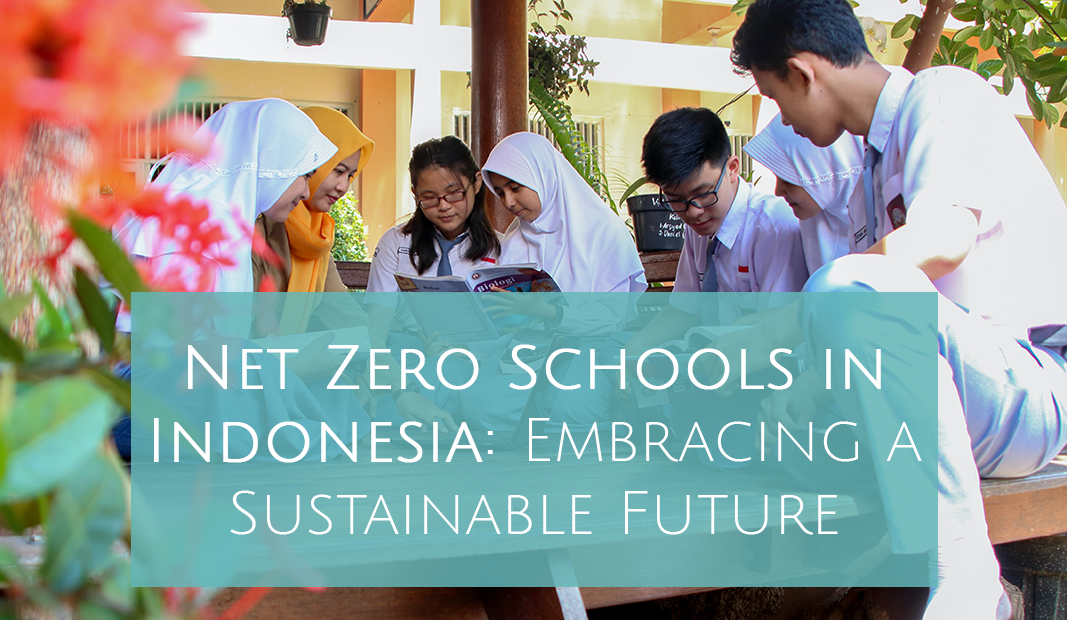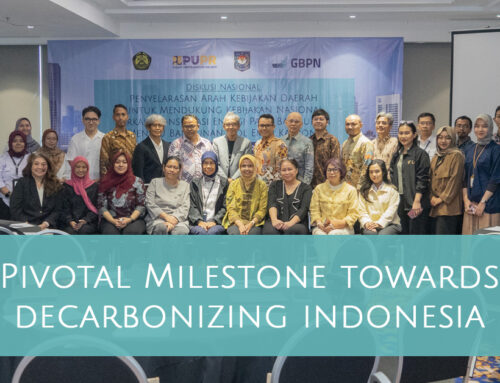The rebuilding of four public schools in Jakarta into Net Zero Emissions Schools marks a significant milestone in Indonesia’s journey towards climate action.
The Provincial Government Education Agency of Jakarta has successfully rehabilitated four public schools using guidelines from the Green Building Council Indonesia (GBCI) through a grant backed by GBPN. Focused on creating a safer, more comfortable learning environment for children, these schools are contributing towards a sustainable future.
Net zero schools have been proven to provide multiple benefits to students and staff, according to Kate McFarlane, Head of Networks and Engagement, GBPN. “Sustainably built schools can have multiple benefits – This could be direct, such as improving energy efficiency, reducing energy demand and incorporating renewables to lead to net zero emissions schools,” Miss McFarlane said.
“This could also be indirect where schools are the heart of communities and serve as ‘living labs’ and demonstration projects for low-carbon lifestyles.”
“Learning in sustainably designed school buildings has also been shown to strongly influence student’s environmental attitudes and behaviour.”
NZE guidelines to rebuild more schools
In January 2021, GBCI provided the Education Agency of DKI Jakarta Provincial Government with Basic Prerequisite Documents for Net Zero Healthy Buildings and guidelines for Net Zero Healthy School Building. These documents were incorporated into the Design & Build process to ensure that schools in Jakarta adhere to high standards for net zero healthy schools. GBCI is the local development partner on the GBPN backed project.
Speaking at the launch of the schools in September 2022, then Jakarta Governor Anies Baswedan said that in the coming year 20 schools will be rebuilt using the Net Zero Emissions (NZE) guidelines.
“We will have another 20 NZE schools in Jakarta next year, and the same number the year after. The NZE schools will make a significant contribution to our aim of 30% emission reductions in the building sector by 2030,” Mr. Baswedan said.
The Governor also emphasized how their newly rebuilt schools will allow kids to learn about what is happening to our planet, and how these changes can reduce energy consumption.
“The kids will look at their schools rooftop solar panels working to reduce reliance on fossil fuel, see how water can be recycled, and how green space is absorbing carbon dioxide”, Mr. Baswedan added.
Schools – a significant contributor to emissions
 Schools are an important part of the buildings sector, with over 500,000 schools across Indonesia with at least 149,000 primary and nearly 41,000 secondary schools. According to Iwan Prijanto, Chairperson, Green Building Council Indonesia, compared with conventional schools, there is a significant energy and emission reduction potentials from NZE schools.
Schools are an important part of the buildings sector, with over 500,000 schools across Indonesia with at least 149,000 primary and nearly 41,000 secondary schools. According to Iwan Prijanto, Chairperson, Green Building Council Indonesia, compared with conventional schools, there is a significant energy and emission reduction potentials from NZE schools.
“Auditing and retrofitting existing schools, and applying sustainable design standards in new construction can halve current average energy intensities of schools, and provide around 90tCO2 abatement per school per year,” Mr Prijanto said.
“NZE schools not only reduce energy consumption and costs, they also provide a healthy indoor environmental quality and positively influence learning outcomes.”
According to Ery Wijaya, GBPN Indonesia Country Manager, public buildings are often overlooked in the efforts to reduce energy consumption, despite their huge contribution to citywide emission.
“Public buildings like schools are big emitters. But they also have a higher chance of adopting sustainable measures because they are publicly owned and operated,” Mr. Wijaya said.
“It is also exciting when progress on sustainable buildings happens in institutions that prepare the next generation like schools. Imagine how the kids can learn about climate change and energy consumption on a daily basis” Mr. Wijaya said.
Ensuring climate-safe and comfortable learning environments
In addition to driving emission abatement, NZE schools hold the potential to inform regulatory reforms for sustainable building policies. Ms McFarlane said that the school construction and retrofitting are priorities for governments.
“ With climate change becoming more extreme, there will be increased demand for air-conditioning in schools. Children will also become more vulnerable to climate associated risks.” Ms. McFarlane said.
“NZE schools will strengthen and embed climate change mitigation and adaptation in the education sector. GBCI and Jakarta Provincial Government have been consistently continuing to translate the insights from the NZE schools program into national policy plans for decarbonizing the building sector.”
GBPN is a member of the Global Alliance for Risk Reduction and Resilience in the Education Sector (GADRRRES). For more information on the NZE schools, please see this video.
The project is part of a portfolio of projects with MADA, Monash University, Australia.
Share This Story, Choose Your Platform!
Stay in touch with how we’re transforming the buildings sector
GBPN runs innovative building policy reform programs in key regions around the world that aim to tackle the climate emergency by decarbonising the buildings sector. Stay up to date with our newsletter.
Stay in touch with how we’re transforming the buildings sector
GBPN runs innovative building policy reform programs in key regions around the world that aim to tackle the climate emergency by decarbonising the buildings sector. Stay up to date with our newsletter.







